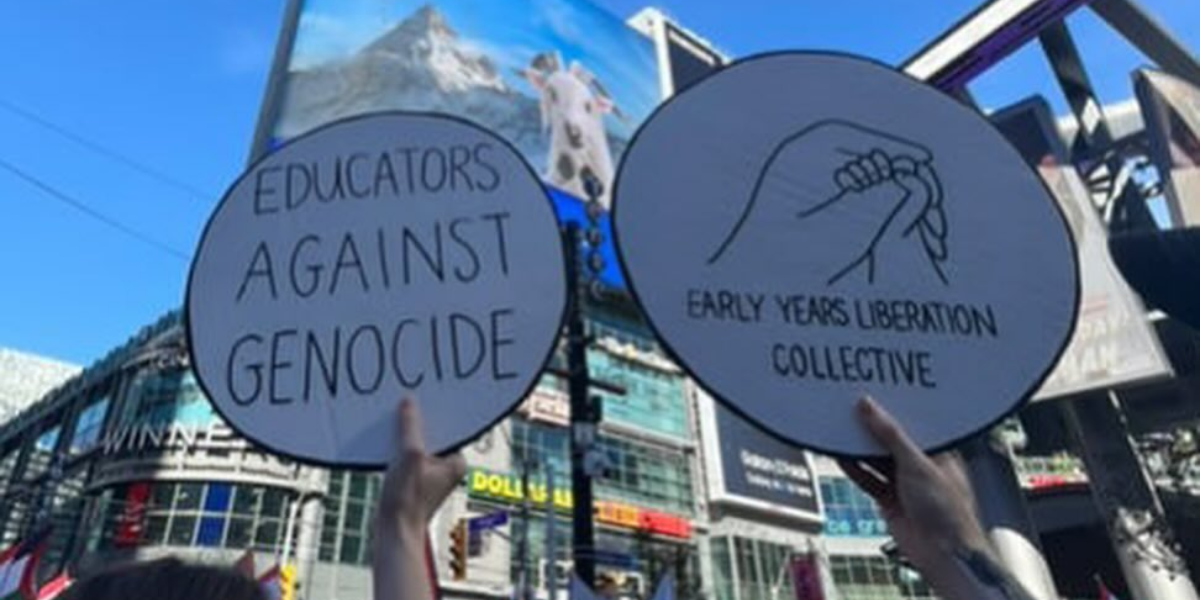The Early Years Liberation Collective (EYLC) is a collective of educators, advocates, activists, and creators in the early years community who have been organizing for the liberation of Palestine since the fall of 2023. The following interview is with EYLC team member “J”, who explains how the EYLC has advocated for Palestine within the early learning sector, where activism can be conflated with being ‘anti-care’ rather than perceived as a natural extension of the work Early Childhood Educators and child care workers do.
K: What is the Early Years Liberation Collective (EYLC) and why was the collective originally formed?
J: The Collective is a community of people who work in early childhood education that share a unified voice and steadfast support for Palestinian liberation. The Collective was formed in the fall of 2023 as we were all bearing witness to a livestreamed genocide in Palestine. Some of us were feeling alone, limited, or vulnerable in showing our solidarity with Palestine in our workplaces. We were feeling frustrated with how silent our sector was and still is. Our collective aims to empower and support each other in fostering connections, building knowledge, and amplifying our values as early childhood educators as we stand against genocide, oppression, and colonization. We believe every life is precious.
How does the EYLC support Palestinian liberation?
As a way to navigate the grief, frustration, and despair witnessing this genocide unfold, the Collective has organized community offerings on themes like moving from despair to community and how to combat feeling voiceless when demonstrating support for Palestinian liberation in the early learning sector. As a collective, we understand that in community, we can energize one another into action, whereas when we feel alone or isolated, we often lose hope.
In the context of my work as an Early Childhood Educator, I aim to promote compassion, justice, and equity. I have found that integrating age-appropriate conversations about human rights into my programming is an effective way of building a foundational understanding of justice and compassion with children, without delving too deeply into political issues that are beyond children’s comprehension.
Having an intentional curation of books is a really powerful tool in early years programming and at home. There are many books that address cultural erasure, community action, displacement, loss of home, and familial ties that we can read with children and have discussions about. During these discussions, children’s curiosity and empathy drive them to help others as they explore the characters’ experiences and emotions.
Some books that are powerful are:
- Stolen Words by Melanie Florence
- With Our Orange Hearts by Phyllis Webstad
- Homeland, My Father Dreams of Palestine by Hannah Moushabeck
- A Map for Falasteen: A Palestinian Child’s Search for Home by Maysa Odeh
- Baba, What Does My Name Mean?: A Journey to Palestine By Rifk Ebeid
- These Olive Trees by Aya Ghanameh
- Where are you from? By Yamile Saied Mendez
- We Care: A First Conversation About Justice by Megan Madison, Jessica Ralli, & Sharee Miller
- Sometimes People March by Tessa Allen
How has the EYLC combated the belief that advocacy is somehow ‘anti-care’ in the early learning sector?
It is crucial to recognize that advocacy for social justice, human rights, and freedom is deeply aligned with the values we uphold in early childhood education. I care deeply for the children in my care. I know they are so precious. When I see images and videos of Palestinian children who are dead, severely injured, starving, displaced, or orphaned, I wonder: how can anyone shut off that part of their brain and not see how all of this is connected? When we advocate for oppressed communities in Palestine, or elsewhere, we are advocating for the well-being of children, families, and their communities.
It is also important to remember that the purpose of early childhood education is not just to nurture children’s cognitive development, but it extends to fostering children’s sense of justice, their understanding of the world, and their ability to empathize with others. By engaging in advocacy, we are teaching children to stand up for what is right and to care for those who are marginalized.
How can workers in the early learning sector get involved in the Collective?
We invite you to our 2025 Mayworks art exhibition, “Liberation,” happening at She Said Gallery from May 30th – June 1st. You can find more information at https://mayworks.ca/project/liberation/.
As well, allies from the early learning sector are welcome to follow us on Instagram (@earlyyearsliberationcollective) for updates about upcoming community offerings. We also encourage everyone to share the work that the Early Years Liberation Collective (EYLC) does with others working in or studying early childhood education. Join us in creating life-affirming conditions within our communities and our global world through collective action and solidarity.
Did you like this article? Help us produce more like it by donating $1, $2, or $5. Donate

